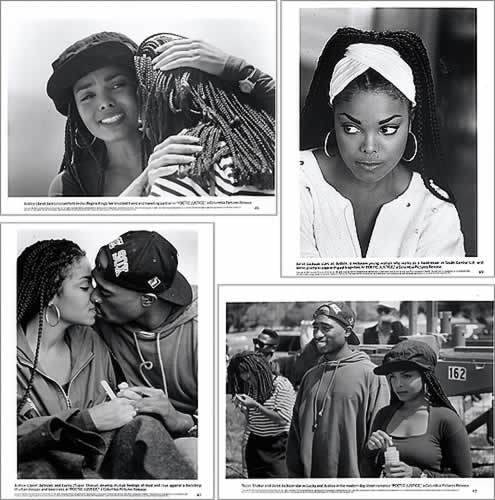
The script is just way too contrived, much like the title. A film about a girl named Justice who writes poetry named Poetic Justice. Ouch. Add to this that the characters are too erratic to feel like real people, let alone anyone you'd want to care about.
Spoiler
The film follows Justice and her friends as they travel from LA to Oakland on a road trip. The film opens as Justice (Janet Jackson) loses her not so great boyfriend (Q Tip) in the very first scene. He gets shot in the head, the blood flying onto her. The scene is typical of the film. The characters simply go back and forth, shouting, kissing, fighting, without much underlying arc. Their personalities and moods simply serve to move the plot along too conveniently. And the plot has ridiculously unnecessary sections like the stop at the carnival. I can see that in editing it was decided to keep the section because it develops the relationship between Justice and Lucky, but it should have been obvious in the screenplay that it felt especially gimmicky after a similar side-story at a family picnic. And then

Justice and her love interest, Lucky (Tupac Shakur), have vulnerable moments, but the rest of the cast are shallow, often heartless and cold. It may be that Singleton wanted to show the various people like this, but it is a harsh statement from a man who knows that he is a rare cinematic voice of the African-American community. Justice's best friend, Iesha (Regina King), and her boyfriend, Chicago (Joe Torry), are particularly juvenile and trifling characters. Regina King has become a fantastic actress, as noticed in Ray. But these characters are ridiculous. Iesha's moment of vulnerability happens quickly. Suddenly after vomiting and being told that her drinking is a problem by her best friend, she comes around and makes a sweeping apology. It's a terrible scene on many fronts. Later she and Chicago break up in a violent fight, instigated by his lack of stamina at sex. It's pathetic for both characters. Is Singleton using these two as a foil for the better love between Lucky and Justice? If so it is too strong a contrast, and they are too awful as people for anyone in the audience to learn any lessons from.

In comparison with his later films, like Baby Boy, I could just chalk this up to youth and immaturity. He was 24 when he made Poetic Justice, so fair enough. That's impressive. There are kernels in the film, especially Janet Jackson and Tupac's performances. They have real chemistry. Justice's character is buoyed by the poetry of Maya Angelou, whose performance and role in the film as a family elder is unfortunately awkward and forced. The film as a whole lacks subtlety and sympathy, let alone a script editor. But there are so damn few films about young black Americans, I'll take what I can get.
Furthermore, I love that it is a respectful story about a postman and a hair-stylist. I think we should revel more often in the stories of more average people. Don't get me wrong that I think film should always reflect reality, but looking at even the indie films of this summer, very few revolve around any people remotely modest or average in their occupations.
No comments:
Post a Comment
I love opinions. But I must say that honey catches more flies than vinegar, and even though I made it through Salo, I don't want to live my life with tons of vile nastiness. So please be honest and polite.